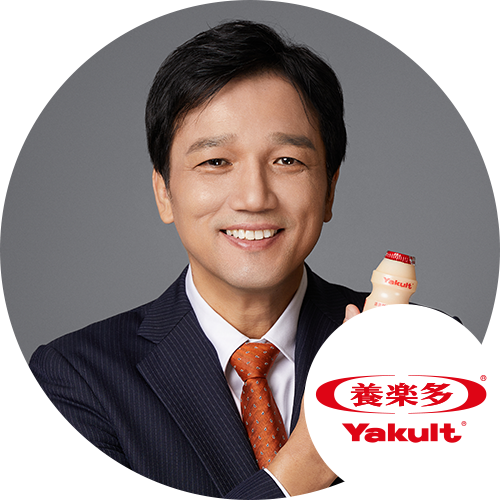
Masaya Watanabe has served as the Deputy General Manager of Yakult (China) Corporation since 2022, overseeing the sales department, assumed the position of General Manager in April 2025. With extensive overseas experience in Mexico and Vietnam, he leverages a global perspective to develop sales strategies tailored to local needs, making outstanding contributions to business expansion.
He excels in rugby and was once a member of the company’s professional team. He highly values teamwork and leadership, applying these principles in his work. His guiding philosophy is “Personal Growth and the Spirit of Challenge,” and he advocates the slogan in Chinese: “‘Yi’ Xin Xiang Shang, Du Yue Wu Xian,” striving to drive continuous growth and challenges for both talent and the organization.
In today's era of constant change, the food and beverage market is facing unprecedented challenges and opportunities:
· Behind the explosive growth of popular categories lies intensified competition and heightened product homogenization. Brands are trapped in an "exchange price for volume" dilemma, while anxiety over long-term development is growing.
· The rapid evolution of distribution channels is driving transformations in product development and sales models. China's food and beverage market ecosystem is undergoing high-speed iteration, requiring companies to stay agile amid rapid changes.
· Chinese food and beverage brands are accelerating their overseas expansion, with total exports reaching USD 76.5 billion in 2023. However, independent brands still have limited market share abroad. How to break through the Chinese diaspora and penetrate local markets remains a critical challenge for brand globalization.
In this dialogue, we will revisit classic cases of brands achieving breakthroughs against the odds and look ahead to future industry trends:
I. Long-term Business Philosophy
Calbee achieved a V-shaped rebound in sales of its potato sticks, once on the verge of discontinuation, through "differentiated texture." Kirin’s Namacha succeeded in revitalizing its brand, with sales surpassing 100 million units within seven weeks. Meiji leveraged the "cocoa polyphenol" concept to stage a remarkable comeback for its bitter chocolate products, overcoming a 17-year market stagnation.
These examples illustrate how companies, by tapping into deep consumer needs and integrating technology with creativity, drive qualitative leaps in their products and build enduring brands that can thrive for decades or even a century.
II. Channel Survival Strategies
Brands like Want-Want, Jianlibao, and Baixiang have remained vibrant through different eras, thanks to solid brand building and strong product capabilities. In a fast-iterating channel environment, how can a brand evolve into a resilient Chinese brand? How can it carve out a niche amid fierce channel competition and maintain close ties with consumers?
III. From Product Export to Corporate Globalization
Amos has secured its footing in international markets with fun, multi-sensory soft candy designs; Ajinomoto continues to expand its global presence by leveraging its unique positioning across markets worldwide.
Facing common challenges in third-country markets, how can different types of brands formulate differentiated globalization strategies?
How can food and beverage companies learn through competition and co-create through collaboration? This dialogue will offer new perspectives for the industry, helping brands tackle future market challenges and lead a new wave of global growth.

